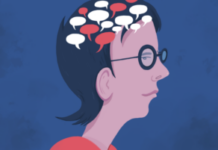“Childhood Poverty Linked to Brain Changes”
“Children from poorer families are more likely to experience changes in brain connectivity that put them at higher risk of depression, compared with children from more affluent families,” according to new research covered by Medical News Today. "Poverty doesn't put a child on a predetermined trajectory, but it behooves us to remember that adverse experiences early in life are influencing the development and function of the brain. And if we hope to intervene, we need to do it early so that we can help shift children onto the best possible developmental trajectories."
Mirror, Mirror: Study Challenges Notion of a Narcissism Epidemic Among Youth
One study indicates that pointed fingers incriminating youth for narcissism may be pointed in the wrong direction.
Trump’s Method, Our Madness
From The New York Times: The effects of Donald Trump's presidency on the American public resemble a psychotic-like state, inducing disorientation, anxiety, and distrust of one's reality.
"Of...
The Elephant in the Room
From Discursive of Tunbridge Wells: Psychologist Rufus May speaks about the often overlooked role of racism in the mental health system. People of color are...
Do Voice Hearers Have the Right to Refuse Psychiatric Drugs?
In this piece for STAT, Shirley S. Wang discusses the Hearing Voices Network and its non-pathologizing, rights-affirming approach to hearing voices and alternative realities.
"Many recovered...
Medical Students’ Racial Biases Lead to Failure to Adequately Treat Patients
False beliefs about biological differences between races are associated with a failure to provide recommended pain treatments to Black people.
Psychologists Suggest Mental Health is Based on Environment
In a new review for Molecular Psychiatry, psychologists Elaine Fox and Chris Beevers examine the connection between mental health genetics and cognitive biases. “'If...














